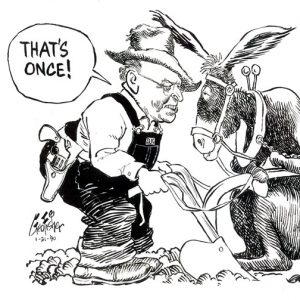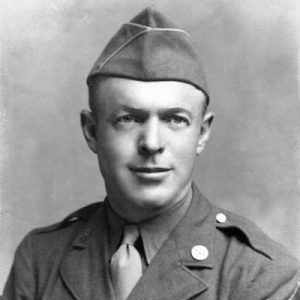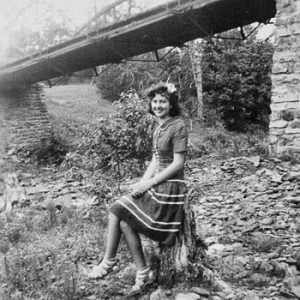calsfoundation@cals.org
Leland Blaine Duvall (1911–2006)
Leland Blaine Duvall was a writer and editor who wrote columns, editorials, and historical articles for the Arkansas Gazette for forty years after World War II. Self-educated and reared on a hardscrabble Ozark Mountain farm, Duvall was an itinerant farm laborer until World War II. His voluminous correspondence from training camps and the war front with family members, friends, and his future wife impelled him to college and a writing career. His commentary on agriculture and economics for the Arkansas Gazette attracted a wide following and won numerous awards.
Leland Duvall was born on June 19, 1911, the eldest of four sons of Omer Duvall and Esther Singleton Duvall. His father was a sharecropper, but he acquired forty acres in the mountain valley at Moreland (Pope County), and Duvall grew up helping his father farm cotton. The rural schools only offered eight grades. Duvall wanted to go to high school and boarded briefly in the town of Atkins (Pope County), which had a high school, and later walked and rode a bus to Hector (Pope County) for a few weeks when the town started a high school. A lack of money or patience (or both) ended his experiments with high school.
His father thought he should be a teacher, so Duvall took the state teacher examination at the age of fourteen and passed it, but the state examiner wrote on his exam certification that he was too young to be allowed to teach. At his father’s insistence, he taught a term of elementary school when he was nineteen at Oak Grove (Pope County), a few miles west of Moreland, and then a term at Moreland, which paid him with IOUs. He decided that he had no future as a teacher—and that migrant farm work offered more reliable pay.
Throughout the Great Depression, Duvall worked at cotton gins and sawmills, following the planting and harvests from the Mississippi Delta to the west Texas plains. He was working in cotton and grain fields near Amarillo, Texas, when the Japanese attacked Pearl Harbor on December 7, 1941. He went home to Moreland and was drafted in March 1942. He was nearly thirty-one years old.
Duvall was a reconnaissance scout with the Fifth Armored Division. He was in the wave of heavy armor and troops that went ashore at Omaha Beach several weeks after the beachhead was established on D-Day. He fought in five European campaigns and was awarded five bronze stars for bravery and meritorious service.
When he was in boot camp at Camp Cooke, California, he wrote a postcard to Letty Jones at Pottsville (Pope County), a girl for whom he had nursed a secret infatuation, asking if she would correspond with him. She did, and the correspondence turned into a romance. They were married in November 1945, two weeks after his separation from the army. His letters, 403 in all, were discovered in the garage of the Duvall home on Crow Mountain in 2010, after Duvall’s death and her move to a retirement home in Russellville (Pope County). A condensed version of the letters was published by the University of Arkansas Press under the title Dearest Letty: The World War II Love Letters of Sgt. Leland Duvall in 2011.
In the spring of 1946, Duvall enrolled at Arkansas Polytechnic College (now Arkansas Tech University) in Russellville under the GI Bill. Soon afterward, the owner and publisher of the Daily Courier Democrat at Russellville died and left the paper to his daughter on the condition that she return from New York and run it for at least a year. She did, and the editor of the paper promptly quit. The business manager at the paper asked the dean at the college, Alfred Crabaugh, if anyone at the college could edit the paper in an emergency. Crabaugh inquired and learned that an army veteran on the campus wrote very well. He summoned Duvall and asked if he thought he could edit a daily newspaper. “I reckon so,” Duvall said. He spent the next day observing the editor, who left at the end of the day and turned the paper over to Duvall. He edited the Courier Democrat until 1955, when he went to work for the Arkansas Gazette in Little Rock (Pulaski County). On May 18, 1954, the day after the U.S. Supreme Court handed down its decision in Brown v. Board of Education of Topeka, Kansas, declaring school segregation unlawful, Duvall wrote the first of several editorials for the Courier Democrat praising the decision and calling on southerners and his own school leaders to end segregation immediately. The editorials were not well received.
At the Gazette, Duvall wrote a daily column on agriculture, then later on business, finance, and farming as the paper’s farm and business editor. In 1969, for the 150th anniversary of the Gazette’s founding, he wrote or edited a yearlong series of magazine-length articles tracing the history of the state’s economic institutions. They were republished by Rose Publishing Co. in 1973 as a book, Arkansas: Colony and State. Duvall occasionally wrote editorials from his first year at the Gazette, but he devoted himself fully to them in the 1980s.
While he had no formal education in economics and finance, Duvall consumed economics literature and became something of a prophet. When Congress lifted restrictions on savings and loan associations and the administration of President Ronald Reagan in 1982 promised them unusual regulatory “forbearance” if they would act more like investment and commercial banks, Duvall wrote that it would spell the end of the thrift industry. Some 750 thrifts (savings and loan associations) failed in the years afterward at a high cost to taxpayers. When the drive began in the late 1980s to lift the regulatory hand from banks by repealing the Banking Act of 1933 (completed in 1999), Duvall predicted that it would produce a cataclysmic financial collapse because the yearning for ever-higher profits would lead banks to take greater and greater risks. The collapse came in 2008.
Duvall retired in 1990 and moved back to Crow Mountain. He died on February 18, 2006, and is buried at Bowden Cemetery on Crow Mountain.
For additional information:
Dumas, Ernie. “Legacies & Lunch Lecture on Dearest Letty: The World War II Love Letters of Sgt. Leland Duvall.” March 7, 2012. Audio online at Butler Center AV/AR Audio Video Collection. Ernie Dumas Lecture (accessed January 6, 2024).
Dumas, Ernest C. “The Leland Duvall Legend.” Atkins Chronicle, March 1, 2006, p. 3, 10.
Duvall, Leland. Arkansas: Colony and State. Little Rock: Rose Publishing Co., Inc., 1973.
———. Dearest Letty: The World War II Love Letters of Sgt. Leland Duvall. Edited by Ernie Dumas. Fayetteville: University of Arkansas Press, 2011.
Tubbs, Brandon. “Dedication Marked Journalist’s Career.” Arkansas Democrat-Gazette, February 22, 2006, p. 6B.
Ernest Dumas
Little Rock, Arkansas
 Leland Duvall Cartoon
Leland Duvall Cartoon  Leland Duvall
Leland Duvall  Leland Duvall
Leland Duvall  Letty Jones
Letty Jones 



Comments
No comments on this entry yet.